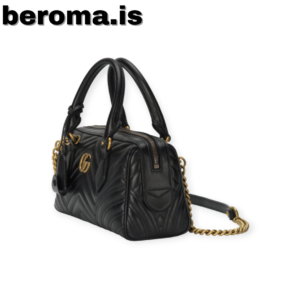 The allure of luxury fashion is undeniable. Iconic brands like Gucci have long been symbols of status, craftsmanship, and timeless style. However, not everyone can afford the steep prices that these luxury items command, leading to a burgeoning market for replica Gucci bags. This phenomenon raises critical ethical and legal questions, challenging consumers to consider the impact of their purchasing decisions.
The allure of luxury fashion is undeniable. Iconic brands like Gucci have long been symbols of status, craftsmanship, and timeless style. However, not everyone can afford the steep prices that these luxury items command, leading to a burgeoning market for replica Gucci bags. This phenomenon raises critical ethical and legal questions, challenging consumers to consider the impact of their purchasing decisions.
The Ethical and Legal Implications
Purchasing and selling replica Gucci bags come with a set of ethical and legal implications that cannot be overlooked. On the legal side, selling counterfeit goods is a direct infringement of intellectual property rights and is punishable under the law. From an ethical standpoint, buying replicas undermines the value of craftsmanship and the luxury industry’s integrity. It also potentially supports unethical labor practices and illegal activities associated with the counterfeit market.
Counterfeit vs. Replica vs. Inspired Designs
Understanding the differences between counterfeit, replica, and inspired designs is crucial for ethical consumers. Counterfeit bags are illegal copies designed to deceive buyers into thinking they are purchasing authentic luxury goods. Replicas are imitations that do not pretend to be genuine but mimic the design and style of luxury products. Inspired designs borrow elements from luxury items without directly copying them, staying within legal boundaries.
How to Spot a Replica Gucci Bag
Spotting a replica Gucci bag requires a discerning eye. Authentic Gucci bags are known for their high-quality materials, precise craftsmanship, and unique details. Key differences often lie in the stitching, materials, hardware, and branding. Authenticity cards, serial numbers, and branded dust bags are additional elements that replica manufacturers often overlook or cannot perfectly duplicate.
The Manufacturing and Marketing Strategies of Counterfeiters
Counterfeiters employ sophisticated manufacturing and marketing strategies to appeal to consumers seeking luxury fashion at lower prices. They often utilize online platforms and social media to market their replicas, taking advantage of the digital landscape to reach a global audience. The manufacturing process may involve low-quality materials and unethical labor practices, contributing to the negative impact on the luxury fashion industry.
Ethical Considerations for Consumers
Consumers face significant ethical considerations when contemplating the purchase of a replica Gucci bag. Beyond the legal risks and the potential to inadvertently support unethical practices, buying replicas contributes to a culture of disposability and undermines the value of genuine craftsmanship. The decision to purchase replicas also affects the perceived value of luxury brands and can lead to broader societal implications around consumerism and sustainability.
Alternative Options for Ethical Luxury Fashion
For those seeking luxury fashion at more affordable prices without supporting counterfeiting, several ethical alternatives exist. Purchasing pre-owned luxury items through reputable second-hand and vintage stores offers an accessible way to enjoy genuine luxury goods. Additionally, supporting smaller designers and brands that emphasize craftsmanship and ethical production can fulfill the desire for unique, high-quality fashion without contributing to the counterfeit market.
Conclusion: Supporting Ethical Fashion and Luxury Industry
The replica market presents complex challenges for the luxury fashion industry, demanding a thoughtful response from consumers, brands, and policymakers alike. By making informed purchasing decisions, consumers can support the ethical fashion movement and help preserve the integrity of the luxury industry. Choosing genuine, ethically produced fashion items—whether through purchasing new, investing in pre-owned, or supporting independent designers—celebrates the true value of craftsmanship and luxury.
The call to action for ethical consumers is clear: support the luxury industry through informed and conscious choices, fostering a more sustainable and ethically driven fashion landscape.